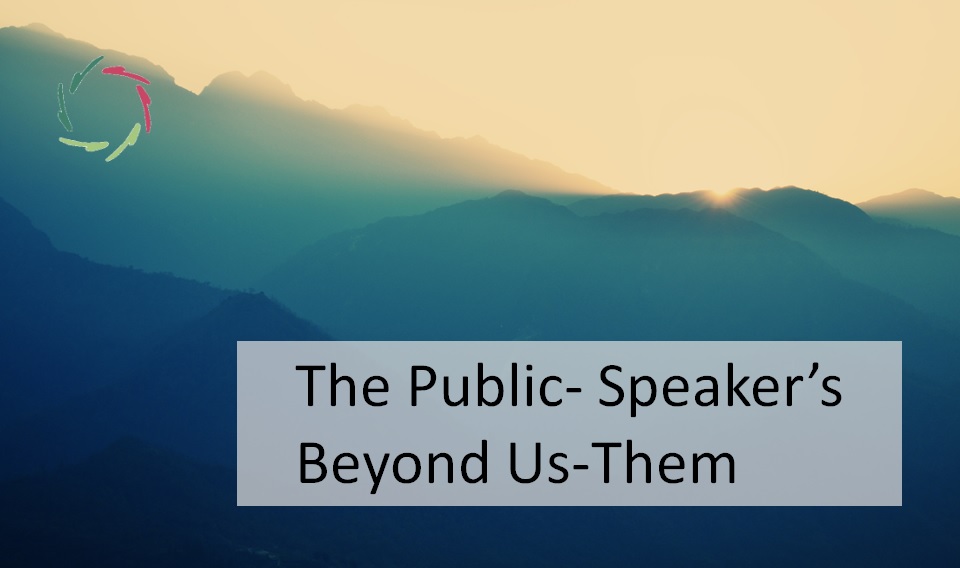The Public-Speaker’s Beyond Us-Them

Within the brain, ‘positive to us’ is related to ‘negative to them’. As any person, a speaker can go beyond.
[see: ‘In-Group Creates Out-Group?’]
More concretely, the same hormones (oxytocin…) and related brain structures that aid in making an ‘us’ (think of a mother and her suckling baby) also aid in making a ‘them’ (think of protecting one’s children against ‘the enemy’). Thus, the brain is keen on us-them differentiation. No wonder in view of natural group evolution.
At the same time, the human brain is very flexible in how-to, thanks to our huge capacity of neuronal ‘subconceptual’ processing. Herein also lies our capacity for ego-transcendence.
To divide is easy, to unite… also
Uniting people, you show how the final common cause may be reached from different angles. It’s a search for common ground. On this basis, you can make your audience feel like you are one of them. Then show that you believe in making them together with you a bigger ‘us’.
Some tips:
- Dress = important. It’s also for you to remember who you are. It’s for them to see you as one of them, perhaps with some higher status but still one of them.
- 95% of time, have eye contact.
- Before your talk: say hello to as many people as you can, also so you may be able to refer to this.
- Powerful pause: great speakers do that a lot. When uncomfortable… slow down, pause. Always pay attention: one group is not the other.
- Try to include the decision maker in your expanding ‘I’, through the audience.
- Get to know the audience’s key concerns, especially those they have never shared, that don’t show up in the pre-questionnaire. What would make a massive difference? (write a narrative/profile about this) Why should people listen to you and change their life?
- At question time, make sure you answer questions in a way that is interesting to all.
This way, the audience gets ‘into the zone’ with you. You become embedded in their conversation; they refer you (and you can charge more).
Having ‘them’ inside ‘I’ also shows in your preparation. For an ‘us’, you will spontaneously prepare better. You will talk to the right person in order to know this, make the right internet inquiries etc.
Don’t look at the audience as a blob. That definitely creates a ‘them’. Look at single persons, in a ‘series of conversations’.
You may push against cultural norms with respect for deeper values. Show people they can ‘broaden the us’ also culturally and without losing one’s own cultural deeper-values. As an international speaker, you open your audience this way to ‘see you as international thought leader they can trust.’
Oxytocin at world level 😊.
Heightening ‘us’ through emphasizing us-them
is instantly gratifying. According to me, it’s never the ideal way. At a deep level, it diminishes your possibilities to transcend dividedness (again: through ego-transcendence) in many inspired and inspiring ways.
As a speaker, one should always strive to be a unifier – within the bounds of common sense.
If the audience is already in an us-them-ing situation
(workers versus management…), it’s tricky to transcend. To them, you’re either ‘with us or against us’. So it’s better to start ‘with us’ while from that same start onwards at least not heightening the ‘us-them’.
Best is to take a position that later on doesn’t make you look like changing your mind. Take care not be seen afterwards as ‘traitor’, which is brain-wise more tricky then plainly being ‘one of them.’
Final goal of public speaking
According to me: bringing people together in a way that doesn’t downgrade their deeper values + heightening their motivation to act this way.
Eventually, deeply uniting is a very powerful motivator.


